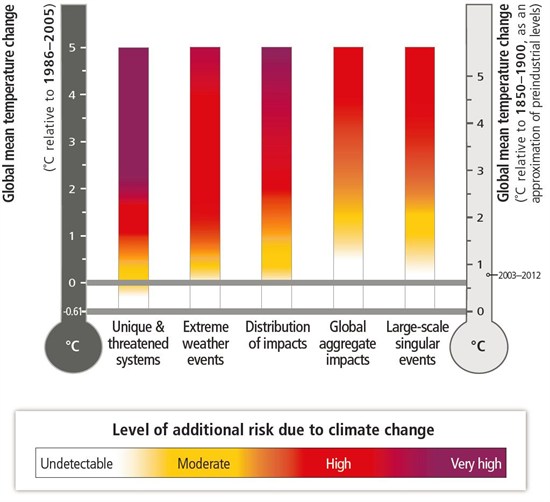There can be no doubt how Professor Chris Field wanted the latest Intergovernmental Panel on Climate Change (IPCC) report to be understood. As well as being co-chair of the IPCC’s Working Group 2, Professor Field is an astute media performer with a keen sense of clear messages.
So it was highly significant just how much emphasis he put on the idea of framing the climate change challenge as one of risk management.
As he told Reuters before the press conference in Yokohama, thinking of climate change in this way makes it easier for many to deal with:
“Climate change is really a challenge in managing risks. And it’s not that we’re talking about identifying particular things that’re going to happen in a particular place, at a particular time.
It is understanding how to be prepared in two critical ways: one is decreasing the amount of climate change that occurs, and the other is finding a way to cope as effectively as we can with the climate changes that can’t be avoided.”
The official IPCC press release picked up on the same language. It explained the two reasons why the characterisation of climate change as risk management is helpful.:
It considers the full range of possible outcomes, including not only high-probability outcomes.
- It also considers outcomes with much lower probabilities but much, much larger consequences.
- Characterising climate change as a challenge in managing risks opens doors to a wide range of options for solutions.
And as if this was not enough, the IPCC’s slickly-produced video to accompany the report started with the phrase “climate change is a challenge in managing risk”.
On the BBC Radio 4 Today programme on the same morning, Professor Field summarised the key points of the report like this:
- Climate change impacts have already occurred with real impacts around the world
- Moving forward, risks with climate change are really pervasive especially with a high emissions trajectory
- Risks are substantially decreased with mitigation and adaptation
Another interesting aspect was the addition to the Summary for Policy Makers – this time – of the famous ‘Burning Embers’ graphic (below) which had been left out of the previous report of 2007 as it was regarded as too alarmist. It explicitly illustrates the increasing risks as global mean temperatures increase.

Source: IPCC WG-II, Summary for Policy Makers, p. 39
So the message was clearly hammered home. Climate change is not all about doom and gloom. And we can manage the uncertainties if we adopt more of a risk-type approach.
It’s an approach many have argued could have advantages with policy makers, and with the wider public, and was the focus of a Reuters Institute study on how the media reported risk and uncertainty.
So how much did the media pick up on the IPCC messaging? The Reuters Institute is involved in two research projects looking at how television and print media around the world are framing their reporting of the three IPCC reports.
A simple word search in the UK print media provides some interesting (very) preliminary results.
- There were 106 reports in all the UK press mentioning climate change and the IPCC on the 30 March, 31 March and 1 April.
- 84 of them included the word ‘risk’.
- But only 3 of them mentioned the words ‘risk management’.
We should not be surprised that so many of the press reports included the word ‘risk’. After all, the word appeared more than 230 times in the 26-page Summary for Policy Makers (compared to 40 times in the 2007 report), more than 5,000 times in the draft full report, and 22 times in the two-page IPCC press release.
But it must be disappointing for the IPCC that the idea not just of the risks (mainly seen as adverse impacts) but of managing the risks did not get more mentions.
There were some exceptions. Both the Reuters and Associated Press environment correspondents wrote pieces highlighting the use of risk language in the run-up to the release of the report.
And Damien Carrington of the Guardian wrote a nice blog on comparing taking action on climate change with taking out an insurance policy.
He is not the first to have made the analogy. Others have suggested the failure to take action in the face of uncertainty on climate change is equivalent to continuing to smoke cigarettes, drive without a safety belt, or refusing to take out home insurance.
But it seems that this sort of framing of the climate change challenge will need a lot of repeated messaging if it is to catch on.


